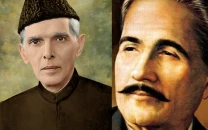Participatory development: With little govt support, people can do wonders
Event held to mark 30 years of Rural Support Programme Network.

Event held to mark 30 years of Rural Support Programme Network.
The poor have the potential to change their destiny and end poverty, if they are organised, save their resources and hone their skills. These three principles form the cornerstone of Shoaib Sultan Khan’s philosophy, one of the pioneers of social mobilisation and participatory rural development programmes in Pakistan.
The success of Khan’s philosophy is evident from the work of community organisations in Pakistan as well as India, examples of which were on display on Monday at the National Convention of Civil Society Organisations, organised by the Rural Support Programme Network (RSPN). The event marked 30 years of RSPN, a network of 12 rural support programmes which engage around 4.8 million rural households across Pakistan for delivery of basic services through social mobilisation.

Speaking on the occasion, Khan, who is chairman RSPN, said of community representatives, “Your achievements have given me and my colleagues the strength to go to the government or any other organisation and say that people have the ability to succeed, if you help them,” he said.
In India, Andhra Pardesh province adopted Khan’s model of social mobilisation and community-based development when he was working for the United Nations South Asian Poverty Alleviation Programme. “The biggest impediment is the government.” Khan said it took him 12 years at the Aga Khan Rural Support Programme to organise 1 million people in Gilgit-Baltistan, while Andhra Pardesh was able to organise around 55 million people because of government support.

Representatives of four civil society organisations and four local support organisations, gave presentations.
Book launch
On the final page of a new book about the life of Shoaib Sultan Khan, author of the autobiography, Noel Cossins, asks Sartaj Aziz, currently serving as the national security adviser to the prime minister, why the concept of rural support organisations Khan was successfully implemented in Gilgit-Baltistan through the Aga Khan Rural Support Programme (AKRSP) but not replicated across Pakistan. The paraphrased sentences which follow encompass the struggles of a man who has dedicated his life to empowering the poor.
“The failure is not Shoaib’s,” Cossins quotes Aziz. “It is the failure of the nation-state to truly serve its people.”
The book, titled “Man in the Hat: The Story of Shoaib Sultan Khan and the Rural Poor of South Asia” was launched during a ceremony in Islamabad on Wednesday.

Published by Vanguard Books, the book recounts Khan’s life story — meticulously pieced together by the Australian writer who interviewed Khan’s family, friends and colleagues — as he worked toward social development at the grassroots level over decades.
Khan’s work is based on the belief that the poor can bring themselves out of poverty if they are organised and their capacity developed.
Former cabinet secretary Ejaz Rahim said the book was about a kind of leadership that not only provided a vision for development with social change but also enhanced equity and justice.
Former State Bank of Pakistan governor Ishrat Hussain said that Khan’s life struggle suggested that the poor were the best judges of what was good for them.
Vijay Kumar, a mission director at India’s Rural Development ministry, said that in India, the state had internalised that rights-based development was not a charity, but a right.
Based on the model advocated by Khan, the Government of India had allocated Indian Rs270 billion for rural support programmes through community support organisations, he said.
Khan, who is the chairman of the Rural Support Programme Network, thanked the panellist and said he owed his work to his mentor, Akhtar Hameed Khan — one of Pakistan’s most prominent development activists.
Muhammad Darjat and Noor Muhammad, two founding members of the AKRSP present in the audience, said they agreed with Aziz’s assessment that the Pakistani state had failed to serve its citizens, citing the monopoly of bureaucracy over rural support programmes as one reason for it.
Published in The Express Tribune, July 2nd, 2013.



















COMMENTS
Comments are moderated and generally will be posted if they are on-topic and not abusive.
For more information, please see our Comments FAQ